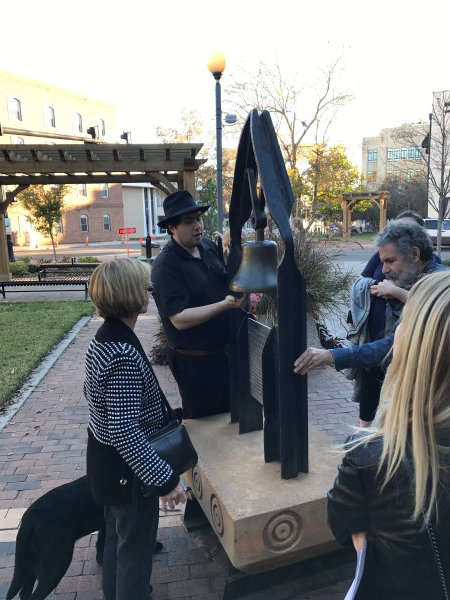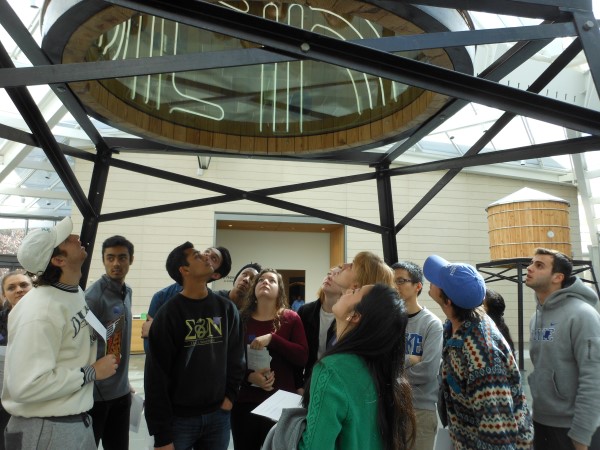In the fall of 2015, arts attorney and arts advocate Dan
Ellison of Durham, NC, attended a training class for audio
describers taught by
Arts Access
of Raleigh. His interest in blindness stemmed from the fact that his
mother developed glaucoma over thirty years ago, and he was already a
big proponent of the arts by personal interest and profession. The class
stimulated him to figure out what he could do with his new-found
knowledge, and the answer came in integrating it into his part-time job
as a professor at Duke University where he teaches a
Service Learning Class offered by the Department of Theater Studies.
Ellison had a vision of creating audio description for public
art on display in downtown Durham. Other possibilities for
description included local museums, such as Duke’s own
Nasher Museum of Art.
He called upon Arts Access for assistance, and he obtained grant funding
to hire two local audio describers as consultants. Fred Brack (who is
also the ADP Webmaster) and Debbie Hippler (who taught the description
class), attended several of Ellison’s classes and taught the basics of
description to the students. Instead of the typical focus on description
of live theatre or movies, however, they focused on description of
artwork. Shortly thereafter they moved on to the Nasher Museum, where
students worked in teams to write descriptions of paintings or other
artworks, read aloud to their fellow classmates, and critiqued by the
two consultants and their spouses, both of whom are blind. Separately,
other blind individuals critiqued their work. Judge Craig Brown, blind
for the last 20 years, commented that he hadn't been to an art museum
for all those 20 years, because it had nothing for him to experience. He
is enthusiastic about what audio description of artwork will provide for
him and other people who are blind.
The students then traveled to downtown Durham where they were assigned
in teams of two to nine statues. The drafts of their description were
critiqued and marked up by their professor and the consultants, and
final drafts were recorded and placed on a telephone access system. In
the future, Ellison hopes to make the descriptions available via a
smartphone app and a website, with signage available at each statue. For
now, you can dial in yourself to hear the descriptions
at 919-694-DADA (3232). After listening to the intro, press 2 for an
index of statues, then a number from 101 to 109, and finally 1 to hear
the descriptions as read by the students.

Professor Ellison (right) and two blind visitors reflect on the
accuracy of audio description just read
[Similar projects were undertaken by Arts Access for outdoor art in
the cities of Raleigh and Cary in previous years. You can listen to
those descriptions as follows:
Raleigh Sculptures and
Cary Outdoor Sculpture Exhibition.]
Each Spring semester, students in the Service Learning class will create
audio descriptions of additional works of public art and architecture to
be added to DADA, including works on the Duke Campus and at the Nasher
Museum.
The DADA project is a collaborative effort of Duke University, the City
of Durham's Cultural Advisory Board, Durham Arts Place, Durham Arts
Council, and Arts Access, Inc. Within Duke, the collaborations include:
Department of Theater Studies, Department of Public Policy, the
Service-Learning Program, the Innovation & Entrepreneurship Program,
Office of Durham and Regional Affairs, The Nasher Museum of Art, the
Office of the Vice-Provost for the Arts, and the Office of Disability
Management.

Students contemplate how they might describe the inside of the
wood tower at the Nasher Museum
Additional articles about the DADA Project:
Written by Fred Brack, May 2017